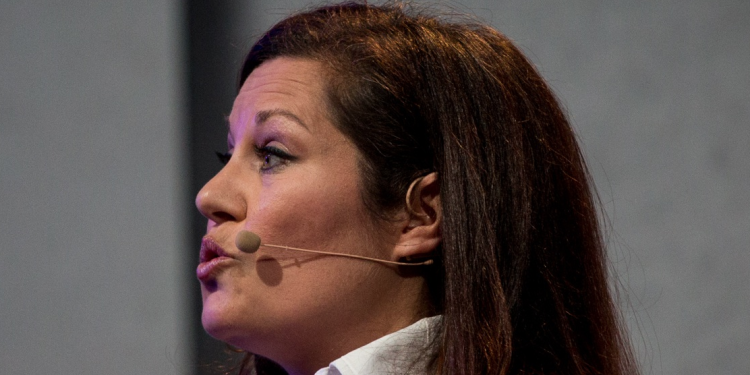
Alana Moceri is a university professor at Universidad Europea in Madrid. Being an American expat in Spain, her areas of expertise cover politics and communication in the US, the European Union, and Spain. Alana is also passionate about public diplomacy, public opinion, and activism. She shares with Expat.com her expat experience in Spain, and — no matter how hard we tried — we couldn't resist including some politics in our conversation.
Alana, you have lived in Spain for 18 years. How Spanish do you feel, if at all?
I don't feel particularly Spanish, in fact, I cringe a little bit when Spaniards inform me that I'm 'practically Spanish.' I think there's a lot of mythology involved in the idea of totally integrating in another country or culture, a myth that's perhaps a bit macho. In my experience, I'm confronted with my foreign-ness nearly every day, despite the fact that I'm very comfortable here and navigate my day to day life in a fairly natural and uneventful way. I'm a very organized and structured person, something that doesn't always mesh well with my adopted country!
What brought you to Spain?
I wanted to take some time off from work and read a story in the LA Times one day about intensive language courses abroad. Since learning a second language had been a personal goal of mine, I decided to enroll in a two month course in Nerja, Spain. In the meantime, I went through a pretty traumatic break up so I decided to come over here and travel until I got sick of seeing my backpack. After spending the summer of 1998 in Nerja, I traveled around Spain and Europe and kept returning to Spain. I was eventually offered a job doing web-marketing for a Spanish language school.
What do you remember about the first months that followed your move to Spain?
Well, when I first got here I was really a tourist. It was over a couple years that I evolved into a resident, which I officially became a little over two years after coming here (shhh). By the time I was living here as an actual resident, I was pretty used to how things worked.
How is the working culture in Spain?
Not the best, in fact, it's perhaps the least attractive part of Spain. Don't move here if making money is your top priority, unless you've got a great idea for a business. Companies don't seem to trust their employees to do good work and employees seem to think they are being exploited. It's a bit of a vicious cycle. I work part time as a university professor, which is very independent work, and part time as a freelance writer, which helps me stay out of the typical workplace politics. Also, whether you're in a university, like me, or not, Spanish work life revolves around the school year, which can be frustrating. It's tough to move anything new forward in the summer, at Christmas or Easter week, which is very different from the U.S. where everything chugs along all year round. All that said, I work with a wonderful group of people and after 18 years it's easy to blame everything you don't like on cultural differences.
Who is more politically active? The American or the Spanish citizen?
Spaniards vote and also turn out in big numbers to protests. I often believe this is because there is a social dimension to it, you'll go to the protest, then get some cañas with your friends after. Americans are more involved in civic groups and have a stronger sense of volunteerism. Any serious professional is usually on the board of some non-profit organization. Americans also create groups and organizations to work on the problems they want to solve since they are very entrepreneurial in every sense.
What's your vision of the European Union?
As a political scientist, the EU is absolutely fascinating since it's so new and nothing like it has been done. It's an incredibly optimistic and idealistic project and I hope the EU finds better ways to communicate with its citizens and create a sense of being European. This is an issue I am researching and am very passionate about.
What's your opinion on the Brexit and its consequences for EU expats in Britain?
Complicated! Big challenges ahead—glad Brexit is not my responsibility!
How do you deal with the criticism coming from Spanish people about the results of the last American elections?
Well, it's my job to explain American politics in Spain. So, I try to focus on that, explaining American politics in a way that Spanish people can relate to and giving my take on it as well. I've learned to shut it down in social settings because we all deserve a break from our jobs from time to time. It can be frustrating when people, mostly men, try to explain my country and its politics to me. (Dude, this is what I do for a living.) We need to create a Spanish word for mansplaining!
What has surprised you the most about Spain lately?
I'd say I was very pleasantly surprised by how well the Spanish people made it through the financial crises. It's a real testament to Spain's strong family life and how much they pull together and take care of each other during tough times.
How do you find the lifestyle in Spain?
The lifestyle is the best part about Spain, even if I have workaholic tendencies. There's always a great new place to go for a glass of wine and some tapas, some of the world's most important art museums and an endless offer of cultural activities. From Madrid you can get to just about any part of Spain for a weekend. It doesn't take a ton of money to live well here.
What do you like the most about Spain?
The lifestyle, the people, the food and wine.
How often do you travel back home and what's that you miss the most about it?
I usually go home to California for about a month every summer. I miss my family and friends, the beach, the waves, fish tacos. Spain and California are two wonderful worlds to live between!
If you had to give an advice to soon to-be-expatriates in Spain what would that be?
If money is important to you, don't come to Spain. Also, it might be fun to come here and quite easy to make a basic living teaching English, but beware of getting caught in the trap of trying to live off that for the long term. I've seen young people put their professional lives on hold for years and I usually advise them to go home and establish a career. That said, there are more opportunities in university teaching for native English speakers because more and more programs are offered in English.
What are your plans for the future?
I'd like to split my time more between Spain and California. It's tough to choose, but in today's world, we don't necessarily have to.



















